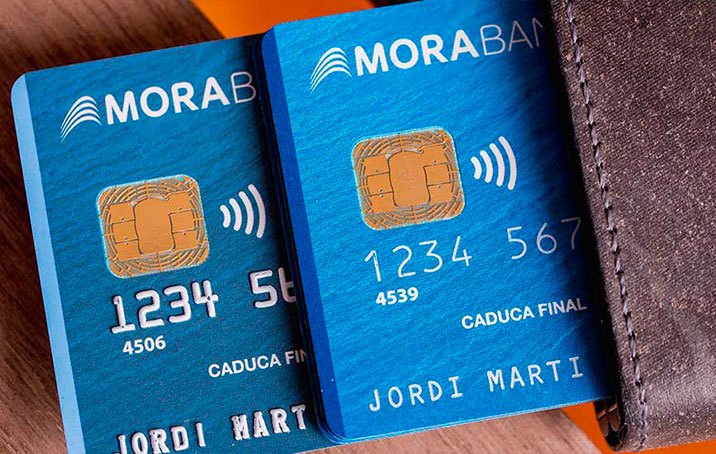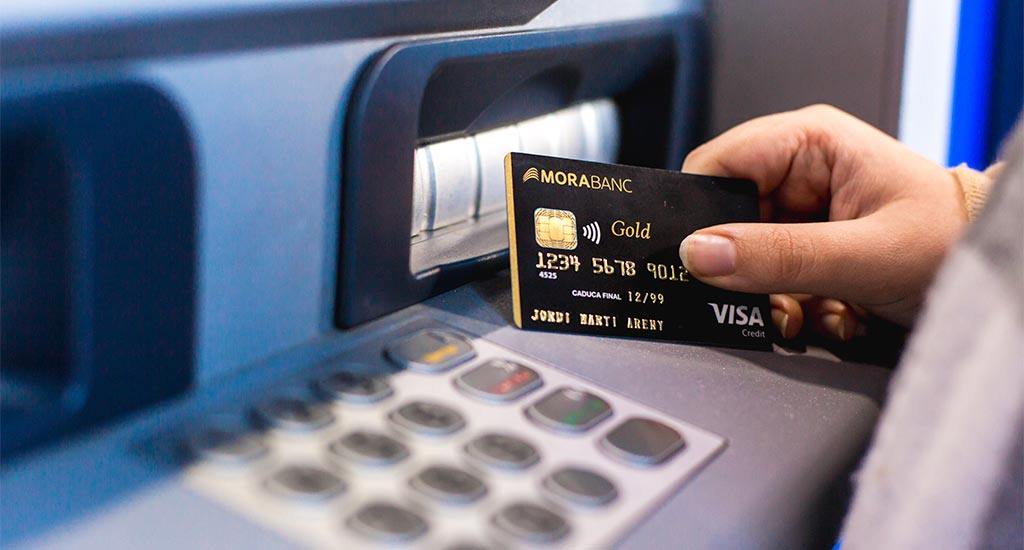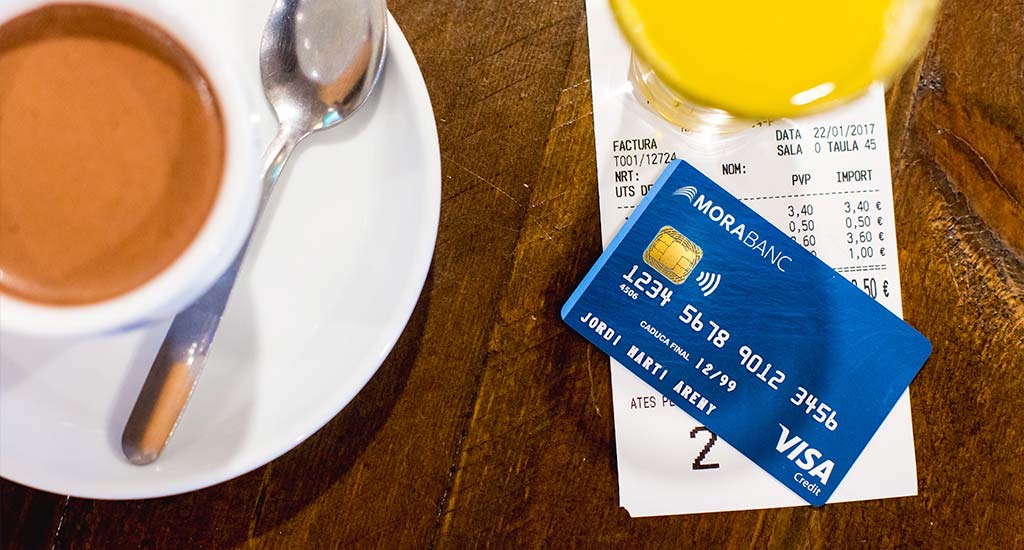The differences between credit cards and debit cards
Financial education | 06.29.2022 | Carlos Mendiola

Credit and debit cards are used to pay for goods or services without the need to carry cash. The main difference between these cards is the method of payment. Credit cards are linked to a line of credit and thus allow you to make transactions with money lent to you by the bank. Debit cards, meanwhile, are linked to the balance of your bank account, which means you can only spend the money that you have in your account.
How are they different?
When a transaction is made with a debit card, the payment will be charged directly to the cardholder’s account, with the card limit being a pre-agreed amount or the total amount of money in the holder’s account. When a transaction is made with a credit card, the payment will be charged to the line of credit and will not be reflected in the holder’s account until the end of the month.
This is because credit cards are a form of financing that is provided to the holder by the bank (hence the word “credit”), which means that the money does not leave the holder’s account at the time of purchase.
On the other hand, debit cards can be viewed as a kind of “purse” because they allow immediate access to the money in the cardholder’s account. This means that cardholders do not need to go to the bank or a cash point to access their money. For these reasons, debit cards are useful for day-to-day spending.
Why choose debit cards?
Debit cards have the following advantages:
- You do not need a line of credit. Using a debit card as opposed to a credit card is an effective way to reduce or limit your personal debt, as you will only be able to use it if you have enough money in your bank account.
- Better control of expenses. Unlike physical money, if you pay with debit cards you will be able to see a bank statement of all outgoing expenses with their corresponding transaction dates, amounts and the name of the establishment.
Why choose credit cards?
Credit cards offer other operations that are not made available to debit cardholders, for example:
- Cash withdrawal from credit cards. Even if there is no balance in your current account, money can be withdrawn (either in cash from a cash point or sent to your current account via online banking) in order to make payments.
- Deferral of payments. At the end of the month, you will receive an invoice indicating how much credit has been consumed for purchases made in the last 30 days. Depending on the amount you spend, you will have the option to defer payment over the course of several months.

Spending limits of credit cards and debit cards
As they are linked to the balance in your account, debit cards allow payments up to the value of the money you have in your account at any given time, providing you do not exceed the monthly limit. With credit cards, payments can be made up to the total limit of the card, which varies depending on what has been authorised by the bank.
For security reasons, most cards have a daily purchase limit and a daily cash point withdrawal limit. These vary depending on the type of card and the issuer. In our case, for example, the MoraBanc Debit Visa cards have a standard daily limit of €600 (provided there is balance available in the account), while the MoraBanc Credit Visa cards have a monthly credit limit of €1,800 and a cash point withdrawal limit of €1000. These limits can be altered in-branch to meet the needs of each customer.
Card security tips
Contrary to what many people think, using a credit or debit card can be safer than carrying cash.
Despite this, there are still a few ways in which your card’s security can be compromised. To avoid any security breaches, we recommend following the tips provided below:
· Avoid making purchases on unsecured sites. Before shopping online, make sure that the online shop is trustworthy. We recommend looking for “secure transaction” symbols, such as the use of SSL encryption (URLs starting with https://). We also recommend not making purchases when you use public WiFi networks.
· Never give out card information over the phone. Do not give out any bank details over the phone. No financial, police or commercial institution should ever ask for this type of information during telephone calls.
· Don’t take pictures of your personal data. In order to stay safe, you should refrain from taking pictures of cards, passwords or other security methods.
· Use a suitable PIN. When choosing a PIN for your card, avoid easy-to-guess numbers such as birth dates, wedding dates, etc. We also recommend memorising your PIN and not writing it down anywhere.
· Check your bank statement and transactions regularly. The MoraBanc App and Digital Banking platform allow you to consult your card transactions quickly and easily. If you notice anything strange, contact Telebanc on +376 884 884 between Monday and Friday, from 8.45 a.m. to 5.45 p.m. (excluding public holidays).

Requirements and fees associated with cards
In the case of credit cards, since the bank provides customers with a certain amount of credit, one of the standard requirements is for the customer’s salary to be deposited directly in the account. This is considered to be a guarantee of stable income. Depending on the bank issuing the card, there may be additional requirements and solvency checks before the card and its credit limit can be approved.
The fees for credit cards are higher than those for debit cards because this financing is provided by the bank. This is also why there are certain charges and fees for operations that are only available for this type of card (such as withdrawing cash from a credit account or deferring payment).
As you can see, there are many differences between credit cards and debit cards. Choosing the best one for you based on your needs: Do you need a card for your day-to-day spending? Or do you need to pay for a holiday or a new TV? Do you need more flexibility in the way you pay? Or do you prefer having a tighter control over your spending? It is always important to be well informed about the features, prices and functionalities of each card so that you can choose the one that best suits your needs.
Remember that MoraBanc puts a wide range of credit and debit cards at your disposal, which means that there is a product that suits your financial situation. One such example is the MoraBanc Jove Visa, which is free for people aged between 18 and 30. When you use this card, MoraBanc will not charge any fees for withdrawing money at any VISA cash point on the planet.
All of our credit and debit cards also offer exclusive discounts at our partner banks, which you can find on our website.
If you need any more information about their features or characteristics, feel free to contact us via Telebanc at +376 884 884, by visiting us at any of our branches or by filling out the contact form at the bottom of our website.
Information on the processing of personal data
In compliance with Law 15/2003 of 18 December on protection of personal data, the customer authorizes that the applicant’s personal data entered on this form will be incorporated into files owned and managed by MORA BANC GRUP, SA – MORA BANC, SAU (hereafter referred to as “MoraBanc”) to process the requested service and, if necessary, to comply with the contracts finally entered into, and also to ensure correct operational procedures.
The applicant expressly authorises MoraBanc to send him/her commercial and promotional communications for products and services and information on the Bank itself, social or other activities, in hardcopy by post or by electronic means (among others, short messages (SMS) to mobile phones, e-mail, etc.). This consent can always be withdrawn, without retroactive effect.
The fact of filling out this form implies that the applicant acknowledges that the information and personal data provided are true, accurate and correct; otherwise, MoraBanc declines all responsibility for the lack of truthfulness or correctness of the data.
The applicant authorises the data provided to be communicated or shared with third parties forming part of the MoraBanc business group, entities which are primarily active in the financial, insurance and service sectors. The applicant is considered as having been informed of this transfer of information by means of this clause. The applicant accepts that he/she may be sent information on any product or service marketed by these companies.
The data processing manager is MoraBanc. The applicant is hereby informed that the rights of access, rectification, suppression or opposition may be exercised in the terms established in current legislation.



